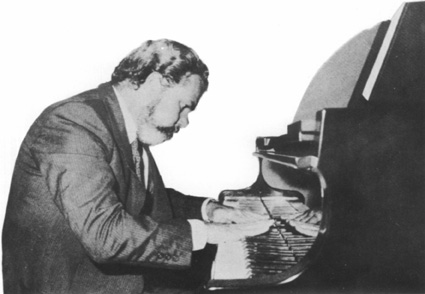Jorge Peixinho was in Macau to conduct an intensive course of composition and give a piano concert featuring the youngest generation of Portuguese composers.
Just prior to coming to Macau, Jorge Peixinho had taken part in Hong Kong's International Festival of Contemporary Music, an event which was held in Asia for the first time ever. The Festival took place in the last week of October and Peixinho participated as a representative of the Portuguese Section of the International Society of Contemporary Music (ISCM). Peixinho is one of the most important and controversial composers of the music vanguard in Portugal. He fought very hard to introduce to his country's music scene the 'new wave'. He established and managed the Contemporary Music Group of Lisbon which has played a very important role in Portuguese culture, and worked very closely with Piérre Boulez and Karlheinz Stockhausen. Both in Portugal and abroad he is fully engaged as composer, pianist, lecturer, professor, concert organizer and critic. Currently, he is teaching composition at Lisbon's Conservatory of Music.
His concert, given on the 12th of November at the concert hall of the 'Academia de Música S. Pio X', showed us that Jorge Peixinho is in fact a very exquisite pianist.
His 'Sucessões Simétricas' (Symmetrical Succession's) is a solid piece even though it was composed when he was only young. 'Estudo I' and 'Estudo III' are both based in a B flat major chord which can be heard throughout the piece, mostly in the second work. Both a fourth and sixth chord and a major seventh chord, have a very sound structure and could only be composed by a master.
Time will tell whether the above pieces have quality or not. We believe so. 'Aquela Tarde...' (That Afternoon...) is worth mentioning, for it was composed in honour of a great contemporary Portuguese composer, Joly Braga Santos. Jorge Peixinho closed his concert with this piece. 'Aquela Tarde...' is based on the last piece composed by Joly which had exactly the same name. A poem by António Machado, an Andalusian poet, inspired Joly. Using the same chords as Joly's piece, Peixinho composed 'Aquela Tarde...' in honour of his good friend. He dismantled and analyzed each of Joly's notes and composed a new and different piece featuring an esoteric feeling.
The first part of the concert featured pieces by young Portuguese composers. Those pieces were 'Jogo Projectado I' (Projected Game I) by Clotilde Rosa, 'Figurações II' (Shapes II) by Filipe Pires, 'Fragmentos' by Isabel Soveral and the piano and tape version of 'Meteoritos' (Meteorites) by Cândido Lima.
In his 'Figurações II', Filipe Pires ventures with great success in the unusual world of lower harmonics. Even though those effects are quite difficult to play, Peixinho managed an outstanding performance which persuaded us.
'Jogo Projectado' by Clotilde Rosa is a well composed piece by someone who has now quite some experience as a composer.
In her 'Os Fragmentos', Isabel Soveral shows the weak points of a young and talented composer whose style is yet uncertain. She is not as convincing as her fellow composer Clotilde, maybe because she was doing some research work when she composed this piece.
Cândido Lima is a prolific composer who is used to a very difficult language of historical-metaphysical connotations. His 'Meteroritos' is an eclectic piece which from an aesthetic point of view is arguable. Nevertheless, it is a piece for the future, despite being closely related to the present time. The only setback was the poor quality of the tape which as far as we know, was due to the fact there is only one electricacoustic studio in Portugal.
The Academy's concert hall was full, which is a good sign. It shows that people are now having an increasing interest in the music of their time. Sooner or later these pieces are bound to become 'classics'.
Jorge Peixinho was one of the features of the Contemporary Music Fortnight. This event was organized by the Macau Cultural Institute in an attempt to promote and introduce avant-guard music. We hope that this year's event can pave the way for future and better events of a similar nature.
Translated by Jose Vieira

start p. 126
end p.